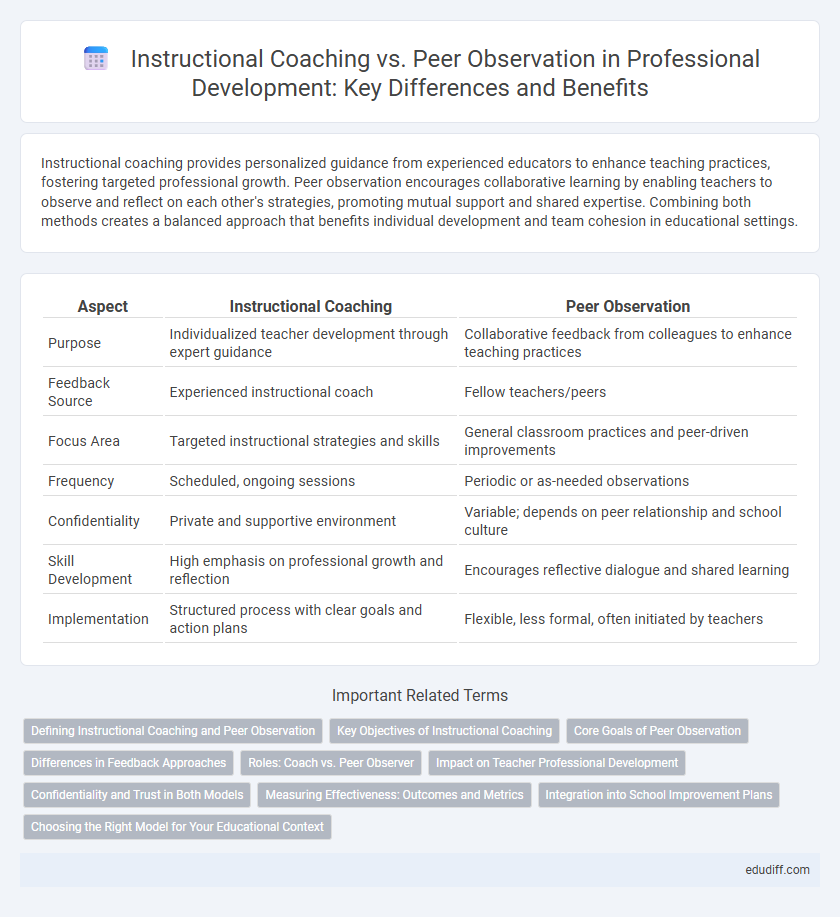Instructional coaching provides personalized guidance from experienced educators to enhance teaching practices, fostering targeted professional growth. Peer observation encourages collaborative learning by enabling teachers to observe and reflect on each other's strategies, promoting mutual support and shared expertise. Combining both methods creates a balanced approach that benefits individual development and team cohesion in educational settings.
Table of Comparison
| Aspect | Instructional Coaching | Peer Observation |
|---|---|---|
| Purpose | Individualized teacher development through expert guidance | Collaborative feedback from colleagues to enhance teaching practices |
| Feedback Source | Experienced instructional coach | Fellow teachers/peers |
| Focus Area | Targeted instructional strategies and skills | General classroom practices and peer-driven improvements |
| Frequency | Scheduled, ongoing sessions | Periodic or as-needed observations |
| Confidentiality | Private and supportive environment | Variable; depends on peer relationship and school culture |
| Skill Development | High emphasis on professional growth and reflection | Encourages reflective dialogue and shared learning |
| Implementation | Structured process with clear goals and action plans | Flexible, less formal, often initiated by teachers |
Defining Instructional Coaching and Peer Observation
Instructional coaching is a structured, collaborative professional development process where an experienced coach provides personalized support to educators, focusing on improving teaching practices and student outcomes. Peer observation involves teachers mutually observing each other's classrooms to share feedback and insights aimed at enhancing instructional strategies. Both methods emphasize reflective practice but differ in roles, with coaching offering expert guidance and peer observation promoting reciprocal learning.
Key Objectives of Instructional Coaching
Instructional coaching aims to enhance teacher effectiveness by providing personalized support, targeted feedback, and collaborative goal-setting, fostering continuous professional growth. Key objectives include improving instructional strategies, increasing student engagement, and promoting reflective practice tailored to individual educator needs. Unlike peer observation, instructional coaching emphasizes sustained relationships and data-driven interventions to support long-term teacher development.
Core Goals of Peer Observation
Peer observation primarily aims to enhance teaching quality through collaborative reflection and feedback, fostering professional growth among educators. It emphasizes identifying effective instructional strategies and areas for improvement by observing and discussing classroom practices. Core goals include promoting continuous learning, increasing self-awareness, and strengthening the teaching community through shared experiences.
Differences in Feedback Approaches
Instructional coaching typically involves personalized, goal-oriented feedback delivered by a trained coach who uses evidence-based strategies to support professional growth. Peer observation feedback is often more collaborative, relying on mutual exchange and shared experiences between colleagues to identify strengths and areas for improvement. While instructional coaching emphasizes targeted skill development and accountability, peer observation focuses on reflective dialogue and building a culture of continuous learning.
Roles: Coach vs. Peer Observer
Instructional coaches serve as trained experts who provide targeted feedback and support to enhance teaching practices, drawing on established methodologies and data-driven strategies. Peer observers engage collaboratively with colleagues to offer constructive insights, fostering mutual professional growth through shared experiences and reflective dialogue. The coach typically guides improvement with a focus on measurable outcomes, while the peer observer emphasizes reciprocal learning and collegial trust.
Impact on Teacher Professional Development
Instructional coaching provides personalized, ongoing support that targets specific teaching strategies, resulting in measurable improvements in instructional practices and student outcomes. Peer observation fosters collaborative reflection and shared best practices among teachers, enhancing collective professional growth and classroom effectiveness. Both approaches effectively contribute to teacher professional development, but instructional coaching offers more tailored guidance that accelerates skill advancement.
Confidentiality and Trust in Both Models
Instructional coaching prioritizes confidentiality by fostering a one-on-one relationship built on mutual trust, ensuring feedback remains private and tailored to the educator's growth. Peer observation, while collaborative, requires clear protocols to maintain trust and manage sensitive information across multiple participants. Both models depend on a foundation of trust to create a safe environment conducive to honest reflection and professional development.
Measuring Effectiveness: Outcomes and Metrics
Measuring the effectiveness of instructional coaching often involves tracking student performance improvements, teacher goal attainment, and qualitative changes in instructional practices through pre- and post-coaching assessments. Peer observation effectiveness is typically evaluated using standardized observation protocols, feedback quality, and subsequent adjustments in teaching strategies observed in classroom practice. Both approaches benefit from integrating quantitative data such as student achievement scores and qualitative data from teacher reflections to provide a comprehensive assessment of outcomes and impact.
Integration into School Improvement Plans
Instructional coaching provides targeted, expert support aligned with school improvement goals, enhancing teacher effectiveness through personalized feedback and professional development. Peer observation fosters collaborative learning and reflective practice among teachers, promoting a culture of continuous improvement within the school community. Integrating both strategies into school improvement plans maximizes instructional quality and elevates student achievement by combining individualized coaching with collective peer insights.
Choosing the Right Model for Your Educational Context
Instructional coaching focuses on personalized, ongoing support from an experienced educator to improve teaching practices, while peer observation involves collaborative, reciprocal feedback among colleagues. Selecting the right model depends on factors such as the school's culture, goals for professional development, and available resources. Schools seeking targeted, sustained growth may prefer instructional coaching, whereas environments valuing mutual learning and immediate peer insights might benefit more from peer observation.
Instructional Coaching vs Peer Observation Infographic

 edudiff.com
edudiff.com